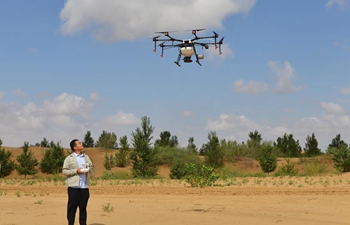SYDNEY, Aug. 9 (Xinhua) -- Australian scientists on Thursday said they have made a crucial discovery of an energy-producing feature of cells that points to new ways of treating common diseases such as cancer and diabetes.
The findings involve the function of mitochondria, or microscopic "factories" in cells that convert food molecules into energy, and how the process can be targeted by drug treatments, the University of Western Australia said in a statement about its researchers' work.
"Mitochondria contain a set of genes that are used to make key protein building blocks that enable mitochondria to produce energy," said the university's Associate Prof. Aleksandra Filipovska.
The protein-making "machines" block themselves from making the proteins until they are "precisely located where these proteins are required within mitochondria. This is highly unusual and previously not found in nature", she said.
The discovery of the atomic structure and features of the "machines" provides not just a new means to target them for drug treatments but also reveal how living systems evolve to function under different energy requirements, she said.
"Defects in mitochondrial function underlie many common diseases such as neurodegenerative, metabolic and heart diseases, cancer, diabetes and ageing," said Filipovska, whose findings were published in scientific journal Nature and included researchers from the Harry Perkins Institute of Medical Research facility.
The next step is to focus on how the defects specifically cause disease, she said.
"We are now working on developing models of disease to study these defects. We are using our models to screen for drugs that can selectively rescue defects in protein synthesis and energy production."

















